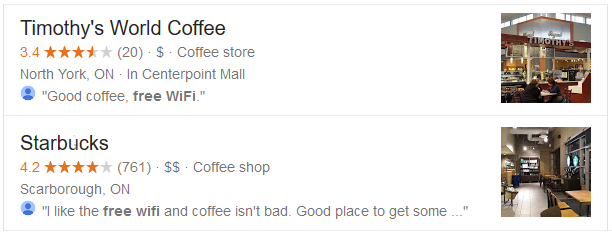
Maximize your local presence through strategic location management.

You won’t be surprised to learn that Google is essentially a monopoly in local search, controlling up to 95% of search traffic in certain verticals. That makes the search giant a critically important source of revenue for local businesses and enterprise brands with distributed local footprints.
But local search is more than Google My Business (GMB) alone—and we’re not just talking about the remaining 5% of non-Google search traffic. Focusing on other local search channels creates a more complete and compelling experience for customers, whereas focusing on GMB exclusively will only limit your brand’s visibility. With that in mind, here are five other aspects you need to consider in order to truly thrive in local search.
Being a data aggregator first and foremost, Google cares about your presence on other websites. It scrapes directories like Bing, Facebook, and Apple Maps to find corroborating information. Conflicting data leads to lower Google rankings; in fact, it’s better to have no corroborating data all. Got skeletal or abandoned listings on other directories? They’re harming your efforts on Google.
A client of ours declined to syndicate their local data to directories other than Google—even though there is no additional cost. After we convinced them to syndicate to all Tier 1 vendors (Bing, Foursquare, HERE, TomTom), their monthly views jumped from 450,000 to more than 600,000.
Remember, though, that there is a point of diminishing returns. Submit your data to all the sites that have relevant, significant web traffic and then stop. It’s usually not cost-effective to manage smaller directories one by one.
Google is ubiquitous, but a rising number of people are avoiding the search giant either because they distrust it or because they prefer experiences offered by Google alternatives.
For instance, the DuckDuckGo search engine has made strong gains in recent years because it pledges to never store user data. So where does it get its business data? From Apple Maps, which will take every opportunity to compete with its arch-rival. Focusing on GMB alone excludes you from this entire audience—and from most iOS users who use their system’s default settings.
![]()
Of course, you may also have a niche or discrete audience not best served by Google alone. For example, restaurant brands cannot afford to neglect Yelp, while hotels and other travel and hospitality businesses have to be active on TripAdvisor. National boundaries also matter: you’d be hard-pressed to find someone in Shanghai who doesn’t use the WeChat app, while Yandex is more popular than Google in Russia.
“Offline local search” may seem like an oxymoron, but consider travel apps and GPS. Outside of major metropolitan areas, online connectivity is far from guaranteed. Travel apps overcome this obstacle by allowing users to plan trips and itineraries before disconnecting. Want to show up for offline travelers? Here’s where they’ll find you.
GPS is still wildly popular, with many newer car models having navigation systems built right into the dash. These systems use their own internal directories to pinpoint stations, restaurants, attractions, and even shopping venues. If your business is on Google but not in major GPS directories, you’re effectively invisible to a huge number of drivers. After all, Google’s 95% market dominance counts for little among those who continue to rely on GPS and other “offline” directories.
Many businesses are unaware that their GMB profiles should point to a specific store page, not their homepage. Google does not want a user in Lower Manhattan to be navigated to Starbucks.com: they want them sent to the store page for 200 Water Street (or whichever of the 20+ nearby Starbucks is closest!). Every business location should have its own unique landing page because a local result is a more relevant result.

But it can be a huge undertaking to create and maintain landing pages for every business location—and Google will not be fooled by near-identical store pages, so they must contain unique identifiers such as address, hours of operation, and store photography. Store locators are often used to accomplish this task, but it’s a poor user experience to send users to a store locator tool rather than the location they have already punched into their search engine.
Local pages also boost rankings—providing another instance of that all-important corroborating information—and enhance online-to-offline conversion rates. If, for example, you list store-specific amenities on each location’s landing page (such as Wi-Fi, free parking, or accessible entrances), you can help your customers decide which of your locations to visit.
Subscribe to our monthly newsletter.
Customer service now encompasses how your customers view you before and after they make their purchase, which has made reputation management a crucial part of local search. Knowing this, Google has placed more emphasis on reviews, including:
Google also now considers the text of reviews to be as important as the star rating. That means reviews containing relevant, search-friendly keywords are highly desirable. For example, local search results for “coffee shop with free Wi-Fi” will give preferential ranking to coffee shops that have reviews mentioning “free Wi-Fi”.

These valuable, visibility-boosting reviews don’t simply appear out of thin air. Fortunately, there is a way for businesses to encourage more text-heavy feedback: by responding to all reviews, as part of a broader online reputation management strategy. In fact, responding to reviews has been shown to increase review volume, increase the amount of reviews with text, and raise average star ratings by as much as half a star.
There are also sizeable SEO bonuses. In 2019, Google began defaulting some search queries—including those with “best”—to return only businesses with four-star review averages or higher. So, if you have a location sitting at 3.9 stars, responding to reviews might just be the edge you need to cross that “best” threshold and suddenly rank for a whole host of new Google searches.
If you were to map out which websites send their data to which businesses (and vice versa), you would be shocked as to what a tangled web it is. As it turns out, there isn’t one big bold line heading straight from Google to everyone else: there are threads twisting in every direction imaginable. Some directories even send data back and forth to each other or cross-reference with competitors.
But that doesn’t mean you need to send your business information to every site and directory under the sun. For most businesses, only Tier 1 really vendors matter—and there is only a handful of those across all industries. That’s why some brands ignore all other websites to focus on Google exclusively, but, as we have seen, that kind of blinkered approach may actually harm your visibility on Google itself.
Every aspect of your online presence matters, and it’s inadvisable to ignore any one of them. Instead, build a cohesive, coherent Enterprise-to-Local strategy to ensure your local audiences can find you, learn about you, interact with you—and keep on coming back for more.
Ask us how we do that better than anybody.
Maximize your local presence through strategic location management.
Maximize your local presence through strategic location management.
Subscribe to our monthly newsletter.